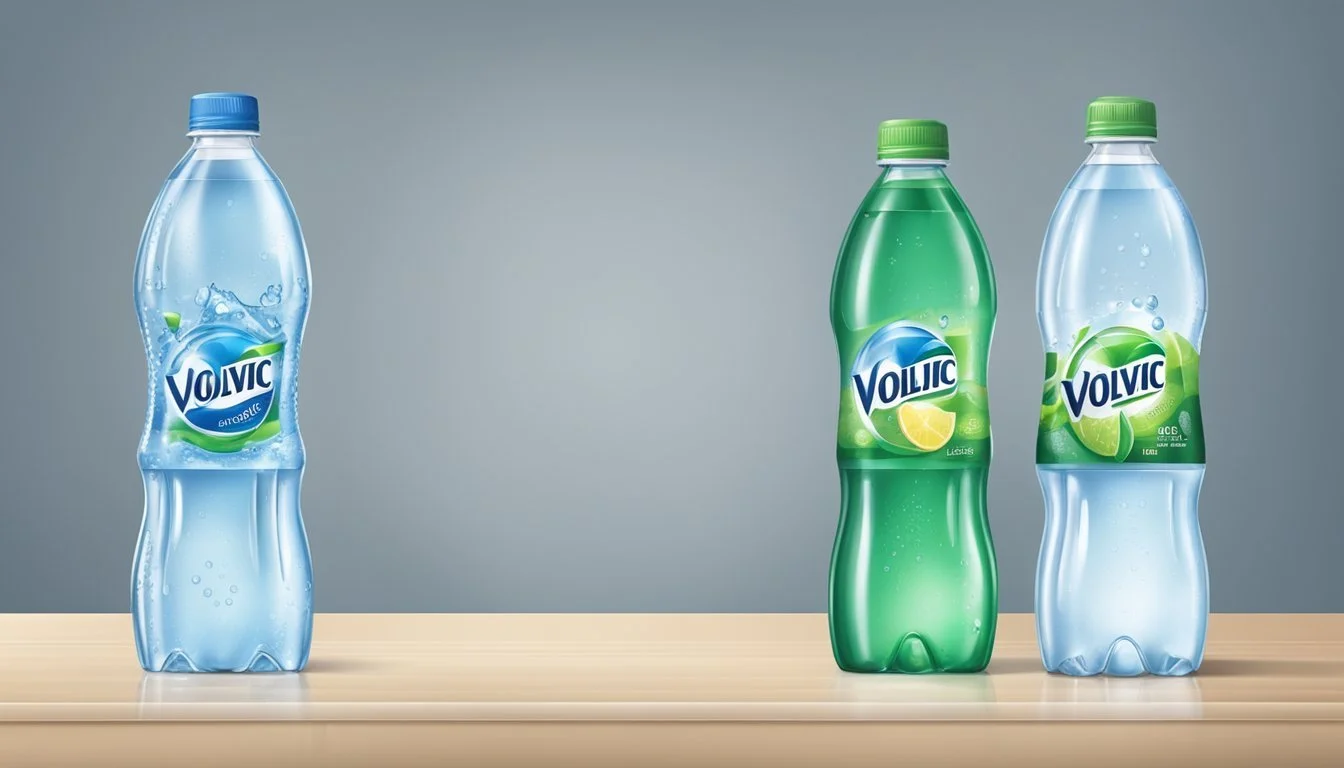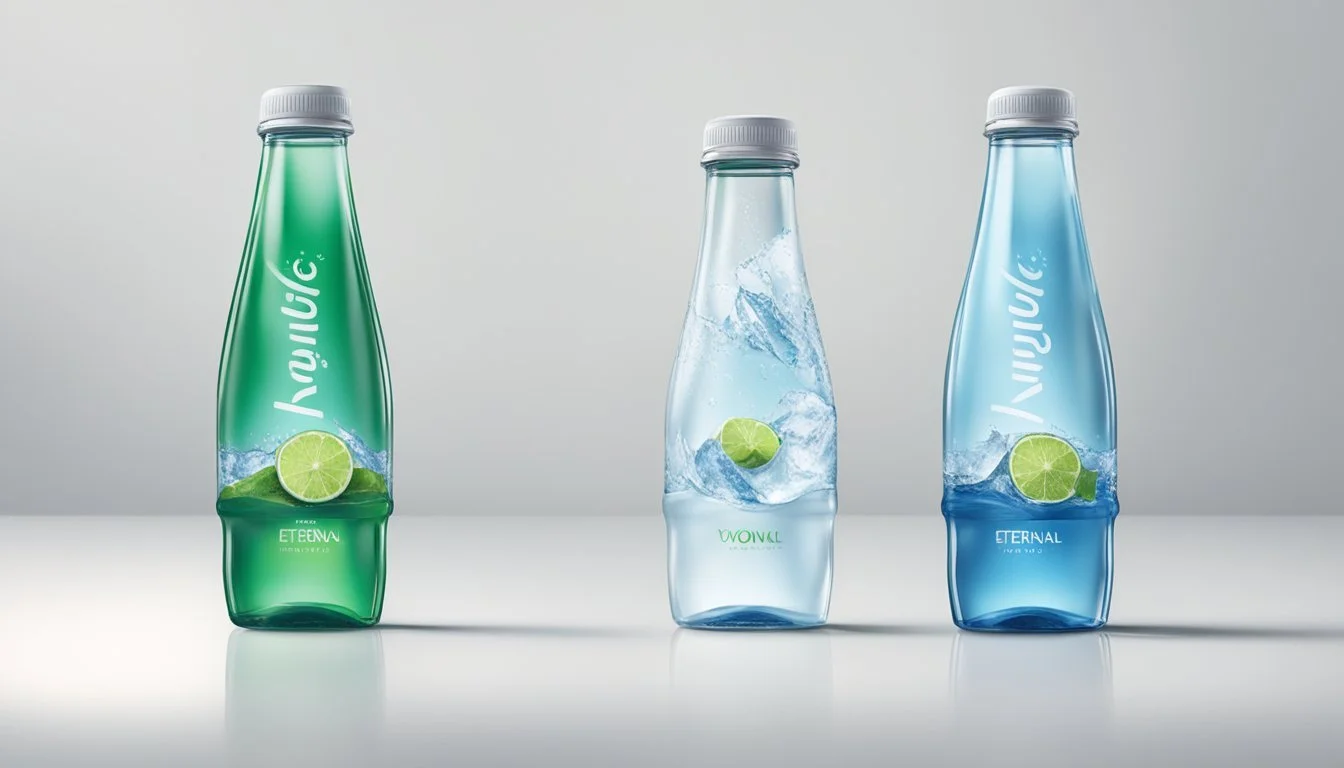Eternal vs. Volvic
Comparing Quality and Taste in Bottled Water Brands
When it comes to choosing bottled water, consumers are presented with a vast array of options, each claiming purity, refreshing taste, and health benefits. Among these choices stand two notable brands: Eternal and Volvic. The bottled water market is saturated with various brands that source their water from unique locations around the globe, and these two are no exception. Eternal touts its naturally alkaline spring water sourced from the Shasta-Trinity Alps, while Volvic is known for its volcanic-filtered water from the Auvergne region in France.
The discussion about which bottled water is superior involves more than just taste; it extends into the processes through which the water is sourced and purified, as well as the mineral content and resultant health implications. Eternal's water naturally gains its minerals and alkalinity as it passes over rocks and through aquifers, whereas Volvic's filtration through volcanic rock gives it a unique mineral composition. Both brands bring forth an impressive mineral profile that may offer health benefits to the consumer.
As individuals seek out the best choice for hydration, they often consider the environmental impact, the water's pH balance, and the presence of contaminants. Consumers are becoming increasingly aware of the ecological footprint of bottled water and how sustainable practices can affect their choices. Eternal and Vollic strive to address these concerns with eco-friendly packaging and responsible sourcing. The comparison between these two brands thus needs to be thorough, weighing factors from taste and health benefits to environmental stewardship.
Understanding Bottled Water
In the following section, readers will gain insights into the various types of bottled water, the common purification methods employed by these brands, and how proper hydration contributes to health.
Types of Bottled Water
Spring Water: Water that comes from a natural underground source and rises to the surface. This type typically contains naturally occurring minerals and is often praised for its taste and mineral content.
Purified Water: Water that has been processed to remove impurities. Methods such as reverse osmosis and distillation are used to ensure high purity levels.
Distilled Water: A form of purified water where impurities and minerals have been removed through boiling and condensation.
Mineral Water: Sourced from a mineral spring, this water contains various minerals such as salts and sulfur compounds.
Ionized Water: Water that has undergone ionization, which alters the pH balance to become more alkaline. Enthusiasts claim it offers health benefits including improved hydration.
Purification Methods
Reverse Osmosis: A filtration process that removes many types of large molecules and ions from water by applying pressure to force it through a semi-permeable membrane.
Distillation: A purification method where water is boiled and the steam is collected, removing contaminants.
Ultraviolet Exposure: A purification step using UV light to inactivate harmful pathogens without adding chemicals.
Filtration: The process of removing impurities from water by passing it through porous materials to trap particles.
Health Benefits of Hydration
Proper hydration is essential for maintaining bodily functions. Here are key details about hydration:
Essential Minerals: Minerals and electrolytes in water, such as sodium and potassium, are crucial for maintaining fluid balance and supporting nerve and muscle function.
Hydration: Adequate hydration improves physical performance, aids in digestion, and helps regulate body temperature.
By understanding these foundational elements of bottled water, consumers can make more informed choices regarding their hydration options.
Comparative Analysis
In this section, the distinct characteristics of Eternal and Volvic bottled waters are thoroughly evaluated. Each brand's unique sourcing and composition are carefully dissected to determine which product stands out.
Eternal Water Overview
Eternal Water is sourced from naturally occurring springs. It boasts a naturally high pH level due to the minerals the water acquires as it filters through layers of ancient rock. One of the key selling points is that Eternal Water is captured at the source and is not subjected to artificial purification processes that can strip away beneficial minerals.
Volvic Water Overview
Volvic Water, on the other hand, originates from the volcanic region of Auvergne in France. The filtration process through six layers of volcanic rock endows the water with a unique mineral composition and a balanced pH. Volvic is known for its purity and the fact that it is naturally enriched with electrolytes and minerals, providing a crisp and refreshing taste.
Taste and PH Levels
When choosing between Eternal and Volvic bottled waters, consumers often consider the taste and pH levels, as these factors contribute significantly to the overall drinking experience.
Acidity and Alkalinity in Water
pH Levels:
Eternal: Typically above 7.0, indicating alkalinity.
Volvic: Slightly acidic to neutral, with a pH reading close to 7.
Bottled water falls within a pH range that can affect both its taste and health implications. Water with a pH below 7 is considered acidic, while pH above 7 means the water is alkaline. Eternal water is naturally alkaline due to minerals picked up during its underground journey. Volvic water, sourced from a volcanic region, has a unique mineral composition that can result in a pH close to neutral. The pH reading is significant because it not only affects the water taste but also influences the body's own pH balance.
Water Taste Profiles
Taste Influences:
Mineral Content: Determines the crispness and refreshing quality.
Purification Process: Impacts the smoothness and purity of taste.
Water taste differs from brand to brand due to varying sources and purification processes. Eternal water is characterized by a smooth taste with a hint of mineral flavor, appealing to those who prefer a refreshing, clean palate. Volvic provides a distinctive taste that many find crisp, attributed to its filtration through volcanic rocks. Consumers' preference for taste can be subjective, yet it is often informed by the balance of minerals and the pH levels. While some have a preference for the silky texture of alkaline waters like Eternal, others may choose the neutral taste profile of Volvic. The choice between these two brands frequently hinges on individual taste and how the water's pH level resonates with one's palate.
Health and Safety
In comparing Eternal and Volvic bottled waters, evaluating health and safety aspects is crucial. Consumers often prioritize mineral content and the levels of contaminants as key indicators when selecting a bottled water brand.
Mineral Content
Eternal water is known for its natural alkalinity, boasting a variety of essential minerals like calcium, magnesium, and potassium that it acquires from its underground source. These minerals are beneficial for hydration and overall health.
Volvic, sourced from the French volcanic region, is rich in volcanic minerals, and it typically contains a higher mineral concentration, including silica, which is claimed to be good for the skin.
Mineral Eternal Volvic Calcium (mg/L) 74 12 Magnesium (mg/L) 25 8 Potassium (mg/L) <1 6 Silica (mg/L) n/a 31.7
Contaminant and Purity Evaluation
Both Eternal and Volvic adhere to strict testing to ensure the absence of harmful contaminants like lead, mercury, and arsenic. They conduct regular checks for bacterial contamination and levels of chemicals such as chlorine and fluoride. Neither brand has been found to contain contaminants above legal or recommended limits.
Eternal typically does not have fluoride added, given its natural source does not require it. In contrast, Volvic has trace amounts of naturally occurring fluoride. Concerning chlorine, both brands ensure that the water is free from chlorine residues, which can affect the taste and purity.
In summary, both Eternal and Volvic water brands maintain a strong focus on delivering safe, mineral-rich water to consumers, adhering to health and safety standards.
Environmental Impact
The environmental repercussions of bottled water production are significant, with plastic waste and brand sustainability practices being major determinants in their overall footprint.
Bottled Water and Plastic Waste
Bottled water inevitably contributes to plastic waste, a pressing environmental concern. These products often contain bisphenol A (BPA), a chemical in many plastics that can seep into water and pose health risks. Moreover, the environmental impact of bottled water is clear when considering the full lifecycle of plastic bottles, from manufacturing to disposal. Plastic bottles are:
Slow to decompose: They can take up to 1,000 years to biodegrade.
Resource-intensive: Producing plastic bottles requires substantial amounts of fossil fuels and water.
Research has indicated that if a large population, such as that of Barcelona, switched entirely to bottled water, there could be a loss of approximately 1.43 animal species per year, with a cost of $83.9 million annually due to the extraction and processing of raw materials.
Sustainable Water Brands
Some bottled water companies are striving to mitigate environmental impacts by:
Reducing plastic use: Introducing bottles with less plastic or alternative materials.
Recycling initiatives: Encouraging and facilitating the recycling of their products.
Carbon footprints: Investing in carbon offsetting projects to balance out their emissions.
Eternal and Volvic are two companies that produce bottled water. Their commitment to sustainability can be assessed by looking at these efforts. For instance, Volvic has a "carbon neutral" certification and has taken steps to reduce the amount of plastic in their bottles. Comparison of these brands in terms of sustainability metrics and initiatives is crucial for an informed assessment of their environmental impact.
Consumer Considerations
When evaluating bottled water options such as Eternal and Volvic, consumers weigh factors like cost and convenience. These considerations often play a decisive role in choosing between brands.
Cost Analysis
Eternal and Volvic water brands differ in pricing, with a number of factors influencing their respective costs. Consumers should consider the price per volume when evaluating overall value. Eternal tends to be priced based on its positioning as a premium natural alkaline water. On the other hand, Volvic, sourced from France, may incur additional costs related to importation, making it potentially more expensive for consumers in markets outside Europe.
Eternal Water (per bottle)
Domestic Market Price: $2 - $3
International Market Price: Varies due to shipping and import taxes
Volvic Water (per bottle)
Domestic Market Price (France): €1 - €2
International Market Price: Increases with distance from France
Convenience and Accessibility
The availability of bottled water brands can significantly impact consumer choice. Volvic is widely distributed across Europe and may be readily found in supermarkets, convenience stores, and online platforms. For consumers outside of Europe, however, Volvic water might be less accessible, depending on the region's import relationships with France.
In contrast, Eternal water is more easily accessible for consumers within the United States, as it is a domestic product. Its distribution channels are widespread across the country, which makes it more convenient for American consumers to find when shopping both in physical retail locations and online.
Accessibility Comparison:
Eternal Water: Likely easily found in US markets; may be less available internationally.
Volvic Water: Readily available in European markets; accessibility diminishes further from France.
Brand Comparisons
This section provides a comparative overview of Eternal and Volvic, two market-leading bottled water brands, against other popular options, assessing their position in the competitive landscape.
Market Leading Alternatives
Eternal offers naturally alkaline water sourced from the Shasta-Trinity Alps, which boasts a naturally occurring pH level without the need for artificial processing. Meanwhile, Volvic is a French brand known for its volcanic-filtered water from the Auvergne region, providing a unique mineral composition.
Other market leaders include:
Essentia, which utilizes Hydro-7 technology for purification and adds electrolytes for taste.
Fiji, originating from a natural artesian aquifer in Fiji, is known for its soft mouthfeel and high silica content.
Evian, with its source in the French Alps, offers water naturally filtered through glacial sands.
Smart Water, known for vapor-distillation and remineralization with added electrolytes.
These brands, along with Eternal and Volvic, are compared based on source, mineral content, pH level, and taste.
Popular Bottled Water Brands
Among the array of popular bottled water brands, several stand out due to their widespread availability and taste profiles:
Poland Spring and Ice Mountain Natural Spring Water are both well-known for their use of natural spring sources in the US.
Dasani, a product of The Coca-Cola Company, and Aquafina, by PepsiCo, are purified municipal waters with added minerals.
Nestlé Pure Life is globally recognized and utilizes purified groundwater with a standardized mineral composition.
Voss, although not on the shelf for its alkaline properties, is nonetheless famed for its iconic bottle and Norwegian sourced artesian water.
In terms of alkalinity, options like Core Hydration and Life WTR also enter the ring, both emphasizing their pH balance and electrolyte content. It's critical to note that the majority of these brands, including Pure Life, Aquafina, and Dasani, often start with tap water before undergoing purification.
The choices among bottled water brands are plentiful, and consumer preference often hinges on water source purity, taste, and added health benefits, such as electrolytes or alkalinity.




